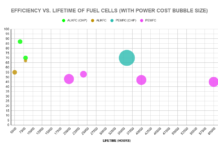by Debra Fiakas CFA
Last week Toyota Motor Corporation (TM: NYSE) announced its intention to share its patented fuel cell technology with other automotive manufacturers. Engineers from competing auto manufacturers can get a look at Toyota’s fuel cell designs up through 2020. Toyota has taken a page from Tesla Motors (TSLA: Nasdaq), which made its electric vehicle battery designs available to the public last year.
Since the car business is intensely competitive, automotive manufacturers are typically quite circumspect about their innovations. However, producers of cars powered by alternative energy sources are faced with a unique problem – the need to develop scale in the power supply chain. By encouraging battery and fuel cell adoption by other car manufacturers as well as innovation in power supplies, Tesla and Toyota hope to foster an expansion of the power distribution network. Readily available power supplies should give consumers greater confidence to adopt the new cars.
Toyota is prepared to share over 5,000 patents with other automakers without royalty arrangements. The patents cover fuel cells composed of membrane electrode assemblies positioned between separators. These fuel cells are ‘stacked’ one against another to achieve the desired voltage. Toyota’s patents cover the membrane composition, separator materials, and the stacking methods among other materials, designs and processes. The company has also developed a unique boost converter to increase the voltage and thereby reduce the number of required fuel cells. A drive battery, motor/generator combination and power control unit complete the system. Toyota has also patented the three-layer design of its hydrogen tanks used to store the required hydrogen on the vehicle. There should be a great deal to learn from pouring over the patents.
Tesla has had mixed results from its technology sharing. So far it does not appear that any automotive manufacturer has adopted Tesla’s battery-powered drive train designs. After only one year it might be a bit too early to suggest Tesla’s policy is a failure. Perhaps Toyota’s gesture will not be any better received. Honda, Hyundai and Volkswagen already have fuel cell designs. Still, it would be beneficial if innovators in battery charging or battery swap schemes used the designs to plan an entrance to the market.
Toyota recently introduced the Mirai passenger car at automotive trade shows as one of the first commercial vehicles in history to be powered by hydrogen fuel cells. Reportedly the first production run for the car is only around 10,000 cars. Most of these first units are expected to be put on the market at dealerships in California where there are at least some sources for hydrogen fuel. To move to larger, more economic production runs, Toyota needs entrepreneurs to see the bigger picture and invest in hydrogen filling stations or at make such services available to petrol stations already in place.
Tesla Motors was apparently been the inspiration for Toyota’s magnanimous gift of fuel cell information to the public. Surprisingly, Tesla’s celebrity CEO Elon Musk has been dismissive of fuel cell technology, referring to ‘fool’ cells. This is not the first time Toyota has been the butt of jokes about its cars. Two decades ago there were many naysayers when Toyota introduced the Prius as the first gas-electric hybrid passenger car. Toyota is now selling two dozen different hybrid passenger car models and sold about 6.1 million hybrid cars in 2013.
It is doubtful Toyota would open the kimono so wide if its engineers were not highly confident in their fuel cell innovation. Likely this confidence is supported by their experience with hybrid car technologies. I believe the appearance of the Mirai in our midst will have the same catalytic impact on consumer choice and business strategies as did the Prius. Cars driving down the road with hydrogen fuel cells could earn this technology much respect, Elon Musk’s comments notwithstanding.
Debra Fiakas is the Managing Director of Crystal Equity Research, an alternative research resource on small capitalization companies in selected industries.
Neither the author of the Small Cap Strategist web log, Crystal Equity Research nor its affiliates have a beneficial interest in the companies mentioned herein.







